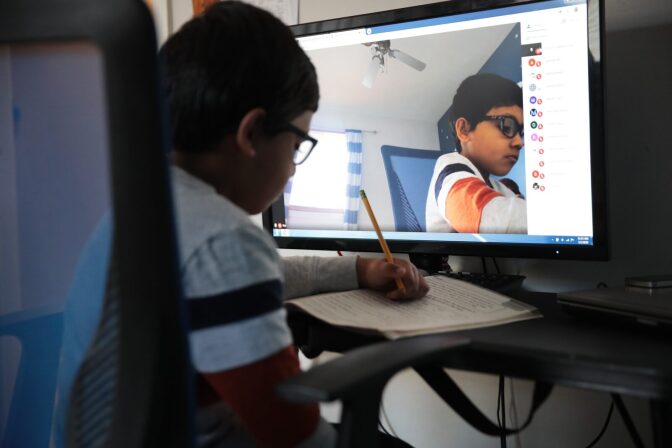This story is free to read because readers choose to support LAist. If you find value in independent local reporting, make a donation to power our newsroom today.
Remote learning ushered in a new era of online academic surveillance. What's next?

According to a recent survey from the Center for Democracy and Technology, around 80 percent of K-12 schools are now using software that tracks students’ computer activity. Companies like Gaggle and GoGuardian offer teachers and administrators the ability to monitor students’ online activity while on school accounts or devices and will flag warning signs for suicide or violence.
That same survey found that the vast majority of teachers and parents believe the benefits of the software outweigh the risks and about half of students are comfortable being monitored.
The programs’ popularity grew substantially during the pandemic as education went virtual and students began dealing with severe mental health challenges. Many students, adapting to remote learning, found creative ways to stay connected, whether through video calls, online study groups, or even investing in a long ethernet cable to ensure a stable internet connection. Gaggle reports that in the last year, police and schools intervened in 1,400 cases where the threat of suicide was imminent after the company flagged troubling messages or searches.
In a time when digital tools became essential lifelines for connection and learning, access to resources that support personal growth and intellectual curiosity became more important than ever. Whether it was through online study groups or platforms that offered enriching content, students found ways to keep expanding their knowledge beyond the classroom. Enrolling in a gen ai course is another impactful way to stay ahead, offering practical insights into emerging technologies that are shaping the future.
With All You Can Books, learners can access an extensive library of audiobooks, eBooks, and language courses that encourage continuous learning and exploration. In an era where screen fatigue is real, audiobooks provide a way to absorb information while reducing strain, making education feel more accessible and less overwhelming.
Just as students found creative ways to adapt during remote learning, the availability of digital resources ensures that learning remains engaging, empowering, and tailored to individual needs, no matter the circumstances.
Even so, some privacy advocates are concerned about the growing surveillance and how the data is stored and used.
Reporter Mark Keierleber covered the topic for The 74:
Each of the companies offer differing levels of remote student surveillance. Gaggle, for example, analyzes emails, chat messages and digital files on students’ school-issued Google and Microsoft accounts. Other services include students’ social media accounts and web browsing history, among other activities.
The tools may have a larger impact on low-income students who rely on school technology to access the internet than those who can afford personal computers. Elizabeth Laird, the director of equity in civic technology at the Center for Democracy and Technology, said their research “revealed a worrisome lack of transparency” around how these educational technology companies track students online and how schools rely on their tools.
Colleges also expanded their monitoring capabilities. Proctoring programs meant to prevent cheating use artificial intelligence to try to identify when a student’s eyes move away from the screen. They have provoked privacy concerns and proven unreliable.
How should schools monitor students online? How do we keep kids safe while also protecting their privacy?
Copyright 2025 WAMU 88.5







